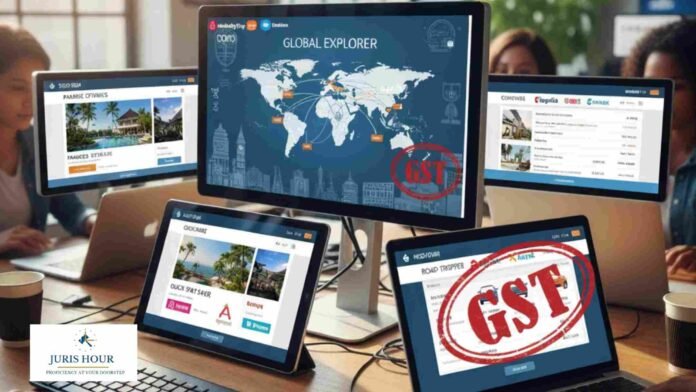The Goods and Services Tax (GST) authorities have widened their investigation into the hospitality sector, shifting focus to online travel portals (OTAs) to determine whether hotels are correctly declaring the taxable value of bookings made through these intermediaries.
Following earlier notices to hotels across the country over alleged underpayment of GST on restaurant and related services, the Central GST (CGST) department has now sought detailed data from major online travel platforms. The move aims to verify if hotels are paying GST on the total amount charged to customers through these portals, or merely on the net amount received after commission deductions.
Tax Department Seeks Booking-Level Data
According to sources, CGST officers have written to leading online intermediaries, requesting booking-wise data, including customer payments, commissions retained by the portals, and amounts remitted to hotels. The department is analyzing whether hotels have been underpaying GST by excluding OTA commissions from their taxable turnover.
An email query sent by Business Standard to the finance ministry remained unanswered at the time of publication.
In one instance, the anti-evasion wing of the Pune GST Commissionerate sought clarification from a Maharashtra-based travel intermediary regarding discrepancies between the total amount charged to guests and the net amount transferred to hotels. The intermediary clarified that the customer’s voucher value included commission, GST, and other charges. After deducting statutory dues such as tax deducted at source (TDS) and tax collected at source (TCS), the remaining amount was remitted to the hotel.
The intermediary also stated that it paid GST on its commission separately, asserting that hotels should be liable to pay GST only on the amount they actually receive.
Three-Party Structure Creates Complexity
Tax experts attribute the confusion to the three-party nature of these transactions—involving the hotel, the OTA, and the end customer. This complex structure often leads to ambiguity over the value on which GST should be applied.
For example, if a guest pays ₹8,500 for a hotel room via an OTA and the portal retains ₹1,500 as commission before remitting ₹7,000 to the hotel, the question arises—should GST be levied on ₹8,500 or ₹7,000?
Past Data Also Under Review
Officials have also asked for booking data from 2019–20 onwards to verify whether similar valuation methods were consistently used in earlier years. The examination aims to ensure uniform tax treatment across transactions facilitated through online intermediaries.
Rate Structure Adds to Confusion
Experts also point to the dual rate structure for hotel rooms, which further complicates GST applicability. Rooms priced below ₹7,500 attract 5% GST, while those above ₹7,500 are taxed at 18%. If the OTA’s commission reduces the amount actually received by the hotel, it may push the booking into a lower tax bracket, even though the guest pays a higher amount.
According to Section 15 of the Central GST Act, the value of supply is the amount “actually received or receivable” for the service rendered. Hence, the taxable value should reflect what the hotel earns, not what the customer pays in total.
Need for Policy Clarification
Industry experts have urged the tax department to issue clear guidelines to remove ambiguity in GST computation for OTA-mediated bookings. They argue that clarity is essential to prevent double taxation and ensure consistent compliance across the hospitality sector.

